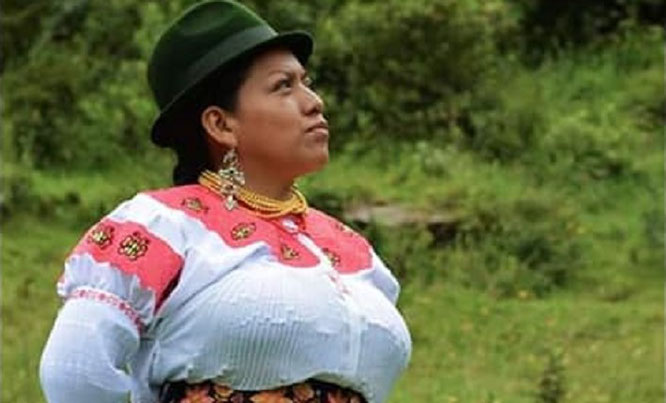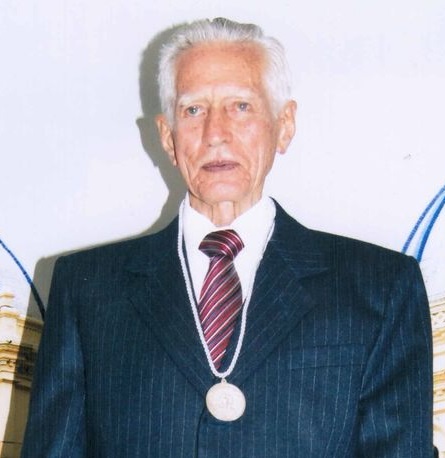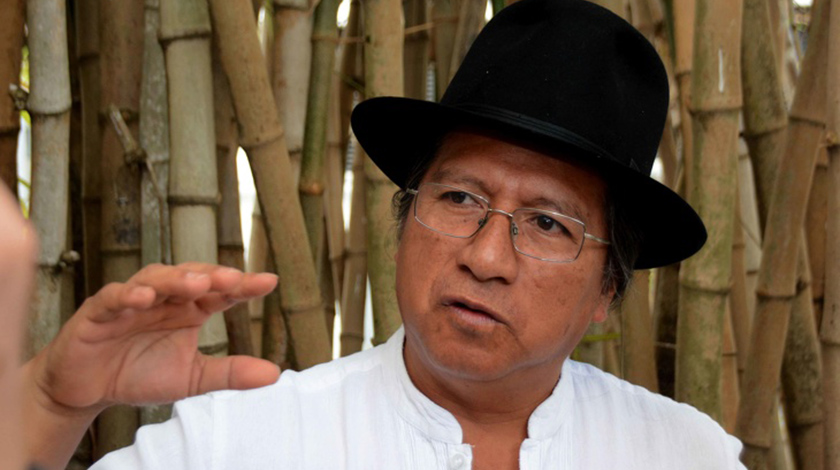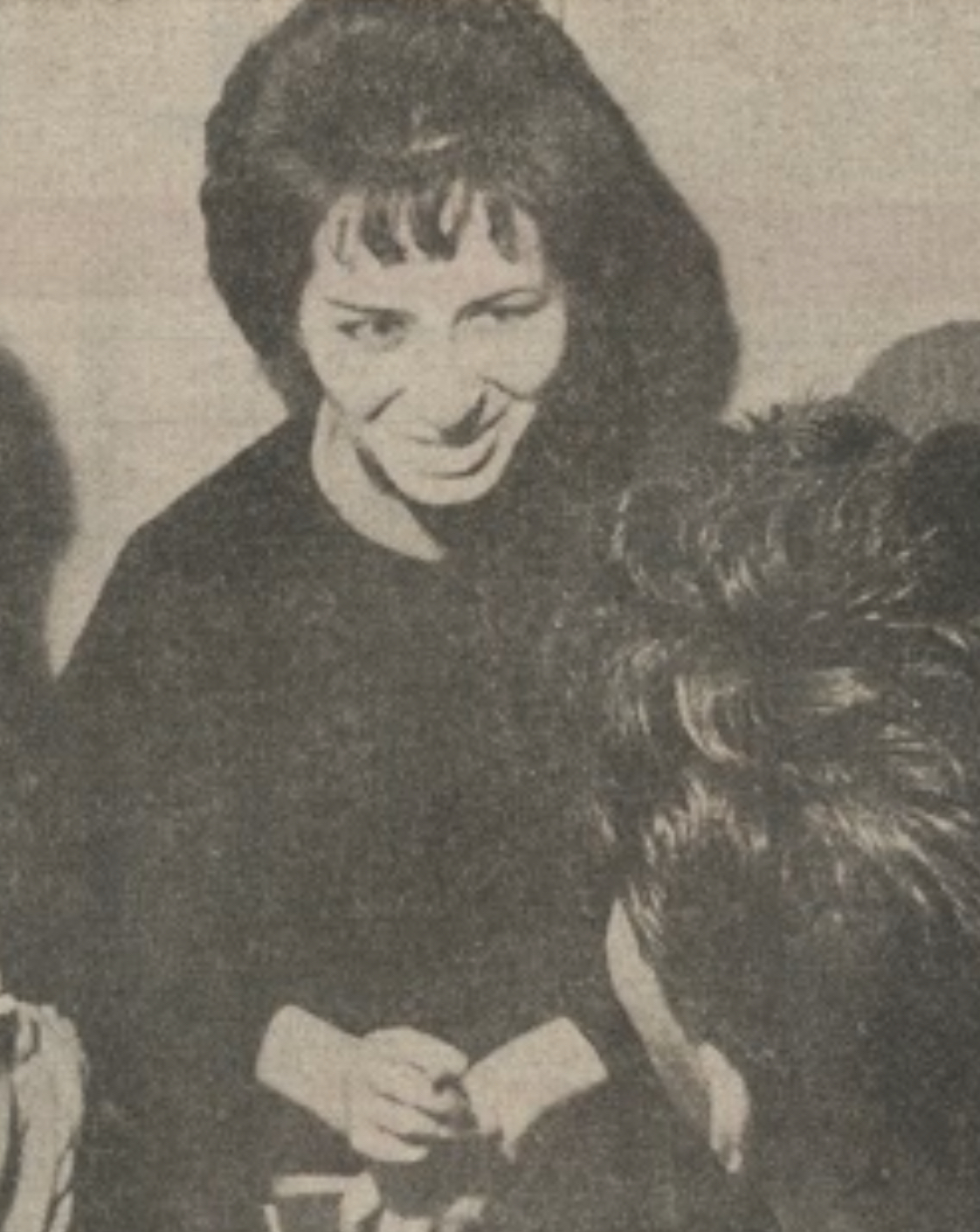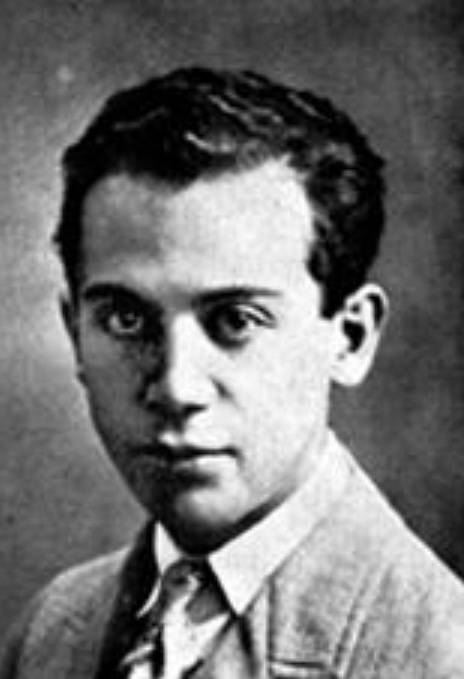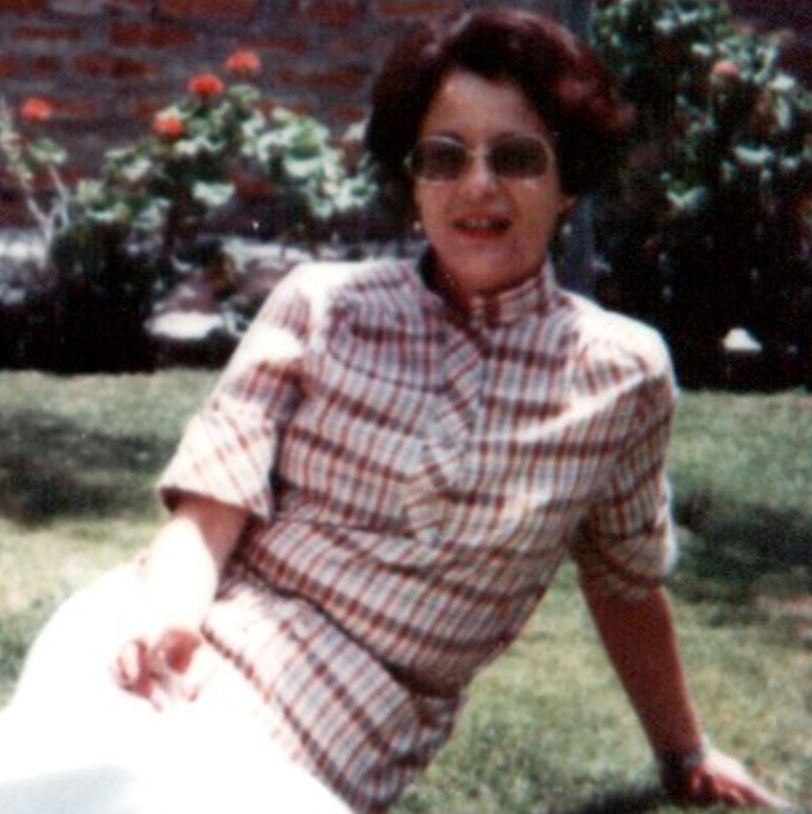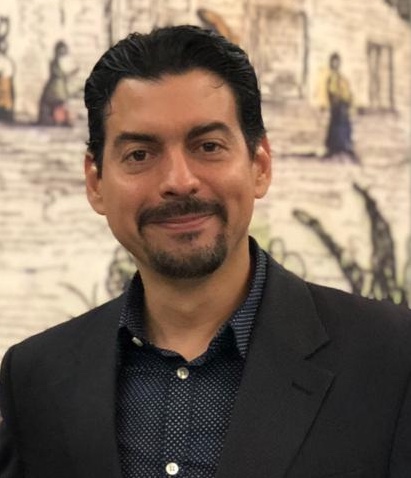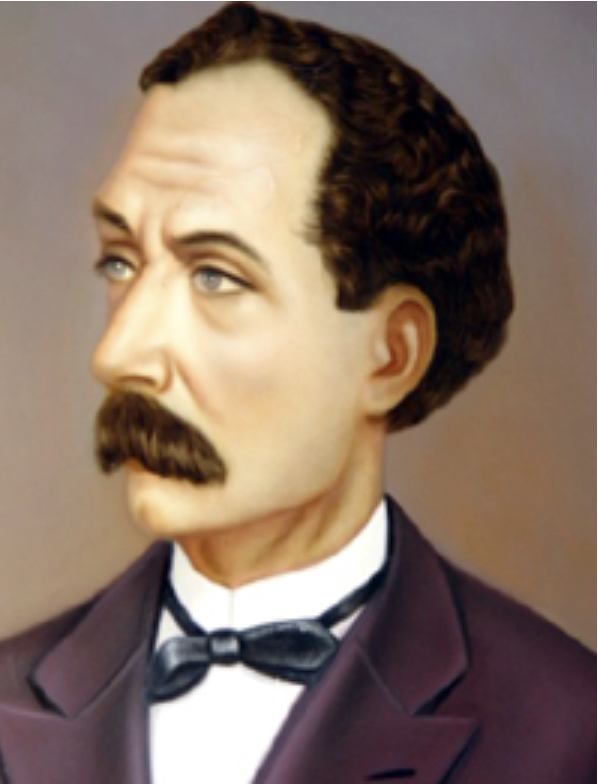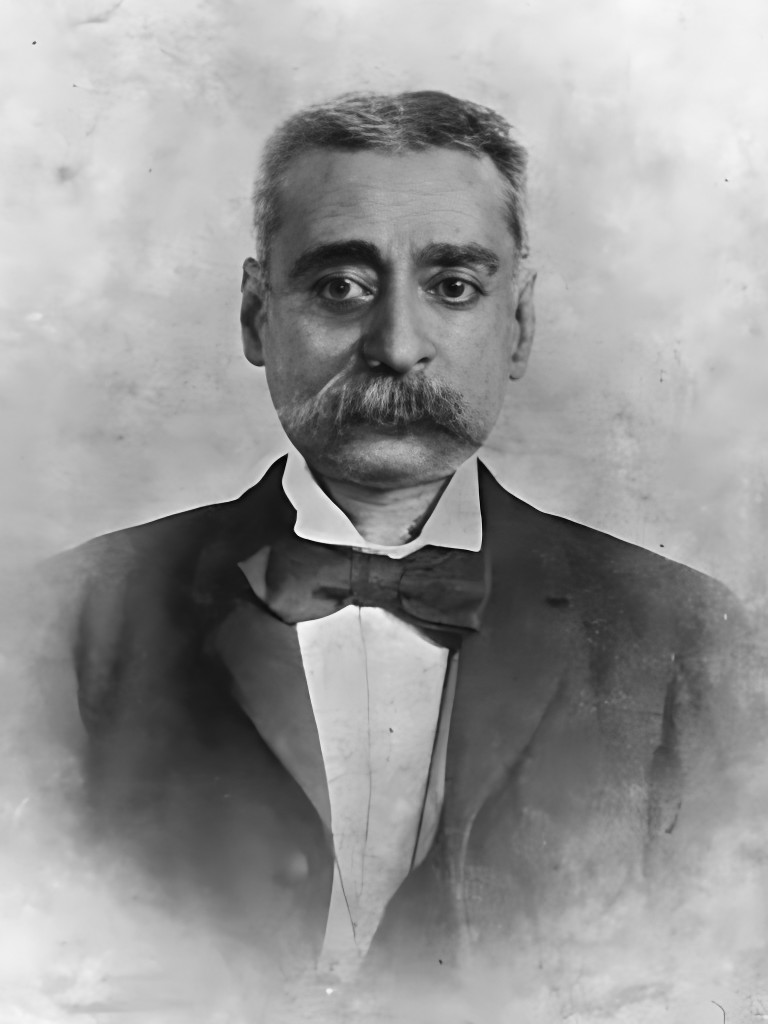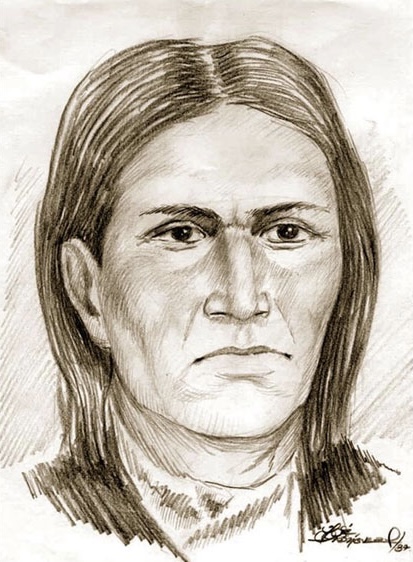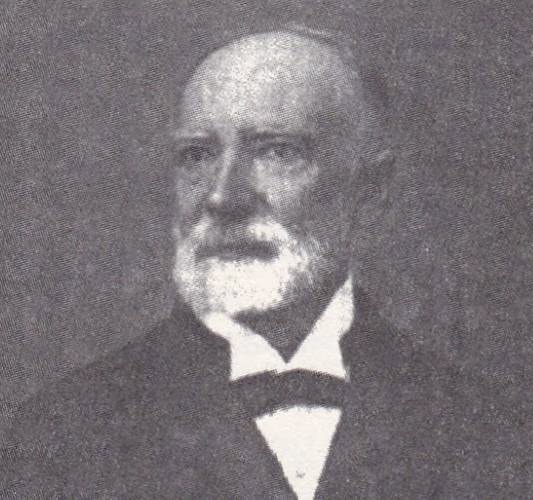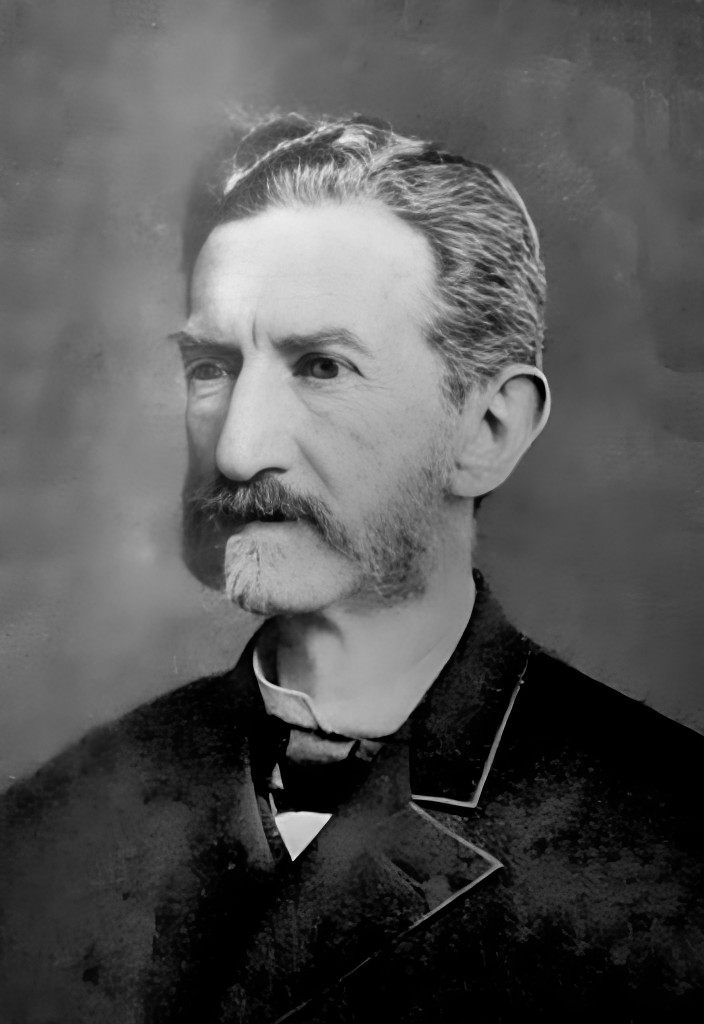Gladys Potosí Chuquín (Angochagua, Imbabura, February 17, 1981) is an Ecuadorian poet and activist who is a member of the Kichwa-Karanki indigenous community. Like the Otavalo, the Natabuela, and the Puruhá, the Karanki are a pre-Inca tribe who adopted the Kichwa language (Quechua) as a result of Incan influence. However, the Iberian invasion that followed the Inca one eventually imposed Spanish as the main language in the Andean area where she is from. She stopped writing in Spanish so that she could find her voice in Kichwa (Quechua), and her poetry serves as a witness to or reflection of the changes that have occurred among her people and herself. She has represented Ecuador at various literature festivals in and outside of Ecuador.
Continue reading “Gladys Potosí Chuquín”Author: richard
Jacinto Cordero Espinosa
Jacinto Cordero Espinosa (Cuenca, June 25, 1926 – September 29, 2018) was an Ecuadorian poet. He authored several poetry collections and his poems have been included in various poetry anthologies both at home and abroad. In addition to being a professor in the Faculty of jurisprudence at the University of Cuenca, he was the director of the Azuayan Folklore Institute and president of the Commission of the Castle of Ingapirca. He was a recipient of the National Cultural Merit Medal from the House of Ecuadorian Culture. He also received the Cultural Merit Medal from Ecuador’s Ministry of Education. He was a corresponding member of the Ecuadorian Academy of Language and a member of the House of Ecuadorian Culture. Some of his poems have been translated into English, French, Portuguese, and German.
Continue reading “Jacinto Cordero Espinosa”Ariruma Kowii
Ariruma Kowii, born Jacinto Conejo Maldonado (Otavalo, Imbabura, Ecuador, August 4, 1961) is considered one of the most important poets writing in the Quechua language. His debut poetry collection Mutsuctsurini (1988) was one of the first books to be written and published exclusively in Quechua. He is also a columist for the Quito newspaper Hoy. In 2007 he was appointed Undersecretary of Education for the Indigenous Peoples of Ecuador in the Ministry of Education, responsible for Intercultural Dialogue. He teaches Literature and Cultural Studies at the Simón Bolívar Andean University. He is the brother of the mayor of Otavalo, Mario Conejo Maldonado.
Continue reading “Ariruma Kowii”Saranelly de Lamas
Saranelly de Lamas, aka Saranelly Toledo de Lamas (Riobamba, 1933 – Guayaquil, 1992) was a poet, journalist and fiction writer. As a journalist she was the Cultural Correspondent of the newspapers El País and Occidente (Cali, Colombia) and El Tiempo de Bogota (New York, U.S.) and editor of the Art Page of the newspaper El Nacional (Caracas, Vezenuela). Her major works include: “Revenant” (1961), “Crónicas para un lugar desconocido” (1982) “Orfeo y otros cantos,” and “Los peces de jade cantan a la Paz.”
Continue reading “Saranelly de Lamas”María Luisa Lecaro
María Luisa Lecaro Pinto (Guayaquil, Ecuador, date of birth unknown – date of death unknown) was an Ecuadorian poet and pioneering feminist known for her avant-garde poetry and progressive social critiques. Writing as “Tatá” for her poetry and “Sor Marisa” in feminist essays, she contributed to Savia, Ecuador’s foremost avant-garde journal, where her work stood out for its surrealism, irony, and bold departure from the sentimental norms of the time. In 1927, Lecaro gained recognition when she placed second in Savia‘s poetry contest, with Hugo Mayo, a leading figure in Ecuadorian avant-garde, taking first. Lecaro’s essays fiercely challenged the patriarchal influence of the Catholic Church, advocating for women’s independence and self-reliance in a socially restrictive era. Although her work was largely overlooked for decades, her contributions were rediscovered in 1999 through Rodrigo Pesántez Rodas’s anthology Del Vanguardismo hasta el 50, which solidified her place as a significant voice in Ecuadorian literature and early feminist thought.
Continue reading “María Luisa Lecaro”Edgar Ramirez Estrada
Edgar Ramirez Estrada (Guayaquil, May 5, 1923 – April 9, 2001) was an Ecuadorian poet and psychiatrist. He published 6 poetry collections during his lifetime and his work has been included in several anthologies. His work was admired and championed by many renowned Ecuadorian literary figures such as Alejandro Carrión Aguirre, Miguel Donoso Pareja, and Carlos Eduardo Jaramillo. Beginning with his poetry collection “Derrumbe” (1969), his style of poetry has been referred to as anti-poetry or no-poetry. All of his books were published by the House of Ecuadorian Culture. He was the son of one of Ecuador’s most important poets, Aurora Estrada y Ayala. He was also the brother of novelist Alcino Ramírez Estrada and poet Isabel Ramírez Estrada.
Continue reading “Edgar Ramirez Estrada”Augusto Arias
Augusto Arias Robalino (Quito, March 15, 1903 – Quito, August 24, 1974) was an Ecuadorian poet, essayist, biographer, anthologist, scholar, university professor, and literary critic. His poetry collection Del Sentir (1920) reflects the modernismo movement of early twentieth-century Ecuador. Arias was a passionate scholar of Ecuadorian letters and authored influential studies, including Panorama de la Literatura Ecuatoriana (1936), España en los Andes (1950), and El Viajero de Papel (1968). He also produced biographical studies on prominent figures such as Eugenio Espejo, Luis A. Martínez, and Pedro Fermín Cevallos. Additionally, he co-edited Antología de Poetas Ecuatorianos (1944) with Antonio Montalvo, marking one of the earliest collaborative efforts to document and celebrate Ecuadorian poetry.
Continue reading “Augusto Arias”Humberto Vacas Gómez
Humberto Vacas Gómez (Quito, 1913-Quito, 2000) was an Ecuadorian writer, literary critic, poet, journalist, and diplomat. As a journalist, his career is tied to the Quito daily newspaper El Comercio. He served as the Minister of Education between 1963 and 1964 and President of the National Union of Journalists. He was a lifelong supporter of democracy and was persecuted by past totalitarian governments for this reason. In 1937, he published his first book of poems, “Canto a lo oscuro,” which was praised by Isaac J. Barrera in his book “Historia de la Literatura Ecuatoriana.” Vacas’ nonfiction books include “La educación artística de las masas,” “Panorama de la pintura ecuatoriana,”and “Los Estados Unidos que yo vi.” A school in Quito bears his name.
Continue reading “Humberto Vacas Gómez”Martha Lizarzaburu
Martha Lizarzaburu, born Martha Emilia Lizarzaburu Dávila (Quito, June 14, 1940 – January 27, 2019) was an Ecuadorian poet and worked as literature teacher for 29 years at the “24 de Mayo” School in Quito. She published 3 poetry collections: “Aljibe” (1964), “Memorial de la sombra y la ternura” (1973), and “Ataduras para el viento” (1977). Her work was also featured in the poetry anthology “Antología de ocho poetas tanáticas del Ecuador“ (2005) edited by Rodrigo Pesántez Rodas.
Continue reading “Martha Lizarzaburu”Eduardo León
Eduardo León Rodríguez (Guayaquil, 1977) is an Ecuadorian poet and author of children’s literature. His poetry collections include: “Censurado” (2018) and “Manzana para mi boca” (2019), both of which were published by El Ángel Editor. His poems have also been included in several anthologies. His first children’s book was “Luz Emilia, un cuento de la infancia.” His latest children’s book is “Ofelia y las cabras mágicas.”
Continue reading “Eduardo León”Miguel Riofrío
Miguel Riofrío Sánchez (Loja, Ecuador, September 7, 1822 – Lima, Peru, October 11, 1879) was an Ecuadorian poet, novelist, journalist, orator, educator, lawyer, and politician. He is best known today as the author of “La Emancipada,” Ecuador’s first novel, which was published in installments in the newspaper La Unión in 1863. Many experts however argue that because the book is usually less than 100 pages long in print, it is really a novella rather than a novel, and that Ecuador’s first novel is in fact “Cumanda” (1879) by Juan León Mera. Nonetheless, Miguel Riofro’s “La Emancipada” has been accepted as Ecuador’s first novel, thanks to the arguments of the well-known and respected Ecuadorian writer Alejandro Carrión (1915-1992).
Continue reading “Miguel Riofrío”Manuel Gallegos Naranjo
Manuel Gallegos Naranjo (Guayaquil, March 26, 1845 – Ibídem , 1917) was a prominent Ecuadorian chronicler, novelist, and poet during the late nineteenth and early twentieth centuries. In 1871, he founded the magazine Espejo, which provoked the ire of President Gabriel García Moreno, leading to Gallegos Naranjo’s exile to Chile. Upon his return to Ecuador, he supported General Ignacio de Veintimilla and established the newspaper Ocho de Septiembre, receiving a government salary. He eventually relocated to Quito. In 1878, he began publishing his initial works as a writer. Subsequently, he released a critical loose leaf targeting Juan León Mera, a supporter of García Moreno. Gallegos Naranjo contributed to the newspaper La Nación in his hometown and served as the editor of Diario Los Andes. In 1883, he published “El Almanaque Ecuatoriano” [The Ecuadorian Almanac] a comprehensive reference containing valuable information across its extensive 300-page content. In 1895, he suffered from thrombosis, leaving him wheelchair-bound. Gallegos Naranjo’s work “Celebridades Malditas” is a historical novel that delves into the lives of infamous characters from old Guayaquil who became entangled in criminal activities due to their ill-fated choices. This novel has been reprinted by the Editorial of the Municipal Library of Guayaquil. Additionally, six of his unpublished works are preserved in the Carlos Alberto Rolando National Authors Library in Guayaquil.
Continue reading “Manuel Gallegos Naranjo”Jacinto Collahuazo
Jacinto Collahuazo (Otavalo, 1665 – 17??) was a cacique (indigenous political leader) from Otavalo, Ecuador. He was a poet and historian who was imprisoned by the Spanish for having written a book in Quechua related to the war between Huáscar and Atahualpa titled, “History of the civil wars of Atahualpa and his brother Atoco, known commonly as Huascar Inca.” His work was burned publicly by the Magistrate of Ibarra and he was sentenced to jail, where he spent his last days. He is considered the first Ecuadorian indigenous chronicler. He lived past 80 but his exact date of death is unknown.
Continue reading “Jacinto Collahuazo”Belisario Peña
Belisario Peña Gómez (Zipaquirá, Colombia, August 5, 1834 – September 7, 1906) was a Colombian poet and educator in Ecuador. At the request of Miguel Riofrio, Ecuador’s Charge d’Affaires, he moved to Ecuador to help found a school with Riofro, Benjamn Pereira Gamba and Francisco Ortiz Barrera. The school, “Colegio de la Unión,” opened on July 20, 1857 at the Santo Domingo de Loja temple. At the beginning of 1860, the Provisional Government of Quito called on Peña and Barrera to found the Colegio de la Unión in Ecuador’s capital. The new Colegio de la Unión opened its doors in Quito on March 2, 1861. Then President García Moreno ordered the merger of the Colegio de la Unión of Quito with the “Nacional” recently created for the Jesuits, who renamed the combined school “San Gabriel.” In 1875 he was a founding member of the Ecuadorian Academy of Language. In 1889 he and Carlos Casares resigned from the Ecuadorian Academy of Language due to the political dispute between the conservatives led by José Modesto Espinosa, against the progressives. In 1912 his friend the Archbishop of Quito, Federico González Suárez, compiled his poems and published them in a volume entitled “Composiciones poéticas del Sr. Don Belisario Peña” [Poetic compositions of Mr. Don Belisario Peña] in 334 pages. preceded by a prologue by González in 62 pages. In 1932 Manuel María Pólit published 11 more poems, minor but not unworthy; among them a translation of Manzoni entitled “El día de la Primera Comunión.” An additional 16 poems are compiled in the Library of the Jesuits of Cotocollao, one of them of great interest, in honor of General Tomás Cipriano de Mosquera. Belisario Peña’s biography was written and published in Colombia by scholar Roberto M. Tisnés J. CMF.
Continue reading “Belisario Peña “José Modesto Espinosa
José Modesto Espinosa y Espinosa de los Monteros (Quito, December 2, 1833 – December 21, 1915) was an Ecuadorian writer, politician, and founding member of the Ecuadorian Academy of Language. He held several important posts during General José María Urbina’s rule, including State Councilor and Senator for Tungurahua province. He was persecuted for his critical articles against General Ignacio de Veintemilla and served as Minister of the Interior and Foreign Affairs during the Progressive era of Ecuador’s history. He held other ministerial positions and was elected President of the Supreme Court of Justice in 1894. However, after being accused of being a right-wing conspirator by General Eloy Alfaro in 1896, he was exiled from Ecuador. He returned to Quito in 1901 and was elected Senator for the Pichincha province in 1902.
Continue reading “José Modesto Espinosa”
